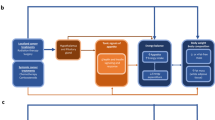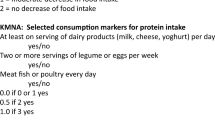Abstract
Purpose
Diet energy density (ED) is associated with energy intake (EI) in cancer patients. There is limited information on the influence of patient characteristics on this association, potentially hampering individual tailoring of dietary treatment in clinical practice.
Methods
We studied the relation between ED (kcal/g) and EI (kcal/kg body weight per day), using a mixed linear model estimating both overall and individual intercept and slopes with patient characteristics as covariates. Age, sex, body mass index (BMI), tumor type, tertiles of survival, weight loss, hypermetabolism, low muscle mass, low serum albumin, inflammation, handgrip strength, and fatigue were entered in the model, and significant effects were retained (p < 0.05). Dietary intake was obtained from 251 food records (995 days) in a group of unselected palliative care cancer patients. ED and EI were calculated for each day including all food and beverages.
Results
Mean EI was 25.8 kcal/kg/day. Age, BMI, fatigue, and survival were negatively associated and hypermetabolism was positively associated with EI. Effect estimates (1 SD) were: -1.9 kcal/kg/day for age, -3.8 kcal/kg/day for BMI, -1.5 kcal/kg/day for fatigue, and 1.1 kcal/kg/day for hypermetabolism. For tertiles of survival, the effect was -4.3 kcal/kg/day for 1st and -2.6 kcal/kg/day for 2nd, as compared to 3rd tertile. After adjustment, ED was still positively associated with EI with an overall effect of 4.5 kcal/kg/day per 1 SD.
Conclusions
Age, BMI, fatigue, survival, and hypermetabolism are associated with EI, but do not substantially influence the association between ED and EI in palliative care cancer patients.


Similar content being viewed by others
Abbreviations
- BMI:
-
Body mass index
- BMR:
-
Basal metabolic rate
- BW:
-
Body weight
- CRP:
-
C-reactive protein
- E%:
-
Percent of energy intake
- ED:
-
Energy density
- EI:
-
Energy intake
- ONS:
-
Oral nutritional supplements
- REE:
-
Resting energy expenditure
- ASMI:
-
Appendicular skeletal muscle mass index
- W%:
-
Percentage of food weight
References
Skipworth RJ, Fearon KC (2007) The scientific rationale for optimizing nutritional support in cancer. Eur J Gastroenterol Hepatol 19(5):371–377
Grant B (2008) Medical nutrition therapy for cancer. In: Mahan LK, Escott-Stump S (eds) Krause’s food and nutrition therapy, 12 edn, pp 959–990. Saunders Elsevier
Hopkinson JB, Okamoto I, Addington-Hall JM (2011) What to eat when off treatment and living with involuntary weight loss and cancer: a systematic search and narrative review. Support Care Cancer 19(1):1–17. doi:10.1007/s00520-010-0964-0
Baldwin C, Weekes CE (2008) Dietary advice for illness-related malnutrition in adults. Cochrane Database Syst Rev (1):CD002008
van Bokhorst-de, van der Schueren MA (2005) Nutritional support strategies for malnourished cancer patients. Eur J Oncol Nurs 9(Suppl 2):S74–S83
Silver HJ (2009) Oral strategies to supplement older adults’ dietary intakes: comparing the evidence. Nutr Rev 67(1):21–31
American_Dietetic_Association (2007) American Dietetic Association oncology evidence-based nutrition practice guideline. ADA evidence analysis library. http://www.adaevidencelibrary.com/topic.cfm?format_tables=0&cat=3250. Accessed 05/12/08 2008
Stratton RJ, Green CJ, Elia M (2003) Disease-related malnutrition: an evidenced based approach to treatment. CABI Publishing, Wallingford, Oxon
Bauer J, Ash S, Davidson W (2006) Evidence based practice guidelines for the nutritional management of cancer cachexia and chronic kidney disease. Nutr Diet 63:S3–S32
Isenring EA, Bauer JD, Capra S (2007) Nutrition support using the American Dietetic Association medical nutrition therapy protocol for radiation oncology patients improves dietary intake compared with standard practice. J Am Diet Assoc 107(3):404–412
de Castro JM (2004) Dietary energy density is associated with increased intake in free-living humans. J Nutr 134(2):335–341
Stookey JD (2001) Energy density, energy intake and weight status in a large free-living sample of Chinese adults: exploring the underlying roles of fat, protein, carbohydrate, fiber and water intakes. Eur J Clin Nutr 55(5):349–359
Kant AK, Graubard BI (2005) Energy density of diets reported by American adults: association with food group intake, nutrient intake, and body weight. Int J Obes (Lond) 29(8):950–956
Ledikwe JH, Blanck HM, Kettel Khan L, Serdula MK, Seymour JD, Tohill BC, Rolls BJ (2006) Dietary energy density is associated with energy intake and weight status in US adults. Am J Clin Nutr 83(6):1362–1368
Poppitt SD, Prentice AM (1996) Energy density and its role in the control of food intake: evidence from metabolic and community studies. Appetite 26(2):153–174
Stubbs J, Ferres S, Horgan G (2000) Energy density of foods: effects on energy intake. Crit Rev Food Sci Nutr 40(6):481–515
Wallengren O, Lundholm K, Bosaeus I (2005) Diet energy density and energy intake in palliative care cancer patients. Clin Nutr 24(2):266–273
Hutton JL, Martin L, Field CJ, Wismer WV, Bruera ED, Watanabe SM, Baracos VE (2006) Dietary patterns in patients with advanced cancer: implications for anorexia–cachexia therapy. Am J Clin Nutr 84(5):1163–1170
Westerterp-Plantenga MS (2001) Analysis of energy density of food in relation to energy intake regulation in human subjects. Br J Nutr 85(3):351–361
Begg MD, Parides MK (2003) Separation of individual-level and cluster-level covariate effects in regression analysis of correlated data. Stat Med 22(16):2591–2602
de Castro JM (2006) Varying levels of food energy self-reporting are associated with between-group, but not within-subject, differences in food intake. J Nutr 136(5):1382–1388
Lundholm K, Daneryd P, Bosaeus I, Korner U, Lindholm E (2004) Palliative nutritional intervention in addition to cyclooxygenase and erythropoietin treatment for patients with malignant disease: effects on survival, metabolism, and function. Cancer 100(9):1967–1977
Håglin L, Hagman U, Nilsson M (1995) Evaluation of the meal model “Matmallen”. A means of estimating consumed amounts of food. Scand J Nutr 39:79–83
Bosaeus I, Daneryd P, Svanberg E, Lundholm K (2001) Dietary intake and resting energy expenditure in relation to weight loss in unselected cancer patients. Int J Cancer 93(3):380–383
Odlund Olin A, Armyr I, Soop M, Jerstrom S, Classon I, Cederholm T, Ljungren G, Ljungqvist O (2003) Energy-dense meals improve energy intake in elderly residents in a nursing home. Clin Nutr 22(2):125–131
Olin AO, Osterberg P, Hadell K, Armyr I, Jerstrom S, Ljungqvist O (1996) Energy-enriched hospital food to improve energy intake in elderly patients. JPEN J Parenter Enteral Nutr 20(2):93–97
Silver HJ, Dietrich MS, Castellanos VH (2008) Increased energy density of the home-delivered lunch meal improves 24-hour nutrient intakes in older adults. J Am Diet Assoc 108(12):2084–2089
Roberts SB, Dallal GE (2005) Energy requirements and aging. Public Health Nutr 8(7A):1028–1036
Blum D, Omlin A, Baracos VE, Solheim TS, Tan BH, Stone P, Kaasa S, Fearon K, Strasser F (2011) Cancer cachexia: A systematic literature review of items and domains associated with involuntary weight loss in cancer. Crit Rev Oncol Hematol. doi:10.1016/j.critrevonc.2010.10.004
Livingstone MB, Black AE (2003) Markers of the validity of reported energy intake. J Nutr 133(Suppl 3):895S–920S
Fearon K, Strasser F, Anker SD, Bosaeus I, Bruera E, Fainsinger RL, Jatoi A, Loprinzi C, MacDonald N, Mantovani G, Davis M, Muscaritoli M, Ottery F, Radbruch L, Ravasco P, Walsh D, Wilcock A, Kaasa S, Baracos VE (2011) Definition and classification of cancer cachexia: an international consensus. Lancet Oncol 12(5):489–495. doi:10.1016/S1470-2045(10)70218-7
Fearon KC, Voss AC, Hustead DS (2006) Definition of cancer cachexia: effect of weight loss, reduced food intake, and systemic inflammation on functional status and prognosis. Am J Clin Nutr 83(6):1345–1350
Kubrak C, Olson K, Jha N, Jensen L, McCargar L, Seikaly H, Harris J, Scrimger R, Parliament M, Baracos VE (2010) Nutrition impact symptoms: key determinants of reduced dietary intake, weight loss, and reduced functional capacity of patients with head and neck cancer before treatment. Head Neck 32(3):290–300. doi:10.1002/hed.21174
de Castro JM (2010) The control of food intake of free-living humans: putting the pieces back together. Physiol Behav 100(5):446–453. doi:10.1016/j.physbeh.2010.04.028
de Castro JM (1998) Prior day’s intake has macronutrient-specific delayed negative feedback effects on the spontaneous food intake of free-living humans. J Nutr 128(1):61–67
Acknowledgments
This study was supported by funds for research and development in Västra Götaland, grant no. VGFOUGSB-2220, and the Swedish state under the ALF agreement.
Conflicts of Interest
None
Author information
Authors and Affiliations
Corresponding author
Rights and permissions
About this article
Cite this article
Wallengren, O., Bosaeus, I. & Lundholm, K. Dietary energy density is associated with energy intake in palliative care cancer patients. Support Care Cancer 20, 2851–2857 (2012). https://doi.org/10.1007/s00520-012-1410-2
Received:
Accepted:
Published:
Issue Date:
DOI: https://doi.org/10.1007/s00520-012-1410-2




